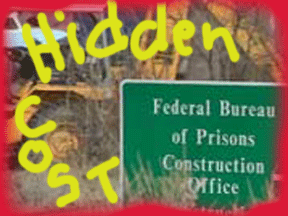
“In the 1990s, at the height of the prison-building boom, a prison opened in rural America every 15 days.”
Okay, now pause for just a second or two to take that in.
This rather alarming piece of information is posted on the website that has been set up to promote a new PBS documentary that is showing tonight (July 24). It’s called Prison Town USA.
The film tells the story of Susanville, California, “one small town that tries to resuscitate its economy by building a prison — with unanticipated consequences.”
I don’t usually push TV shows, but this one is an exception. It deals in an extremely engaging and deeply human fashion with an issue we ignore at our own peril—namely the fact that the United States now imprisons more people per capita than any other country in the world. This attempt to incarcerate our way out of a host of social problems on such a grand scale is an experiment like no other in world history. Yet the unprecedented “jailing of America” is barely noticed by most Americans because, as the movie points out, most of the prisons have opened in remote areas like Susanville.
Hence Prison Town. The film was shot over a four year period and follows the lives of four families that live in this town that now houses 11,000 inmates, more than the town’s population.
Across the country prisons are transforming our economy, psychology and culture,” says co-director Po Kutchins. “We hope our film promotes much-needed dialogue about the wisdom of America’s policies.”
So watch it, TiVo it, do what ever you have to do. I suspect you’ll find it’s worth your time.
NOTE: LIGHT BLOGGING THIS MORNING because I’m headed off to an all day meeting. Back with a vengeance early tomorrow a.m. (or perhaps before).
**********************
UPDATE: MY BAD. TURNS OUT THIS SHOW IS NOT SHOWING IN OR ANYWHERE NEAR THE LOS ANGELES PBS MARKET. If you live in say, Missoula, Montana, Spokane, Washington, Chicago, IL (those were just the areas I randomly checked)….or any number of other places, you can watch this show.
Not in LA. But, hey, really why should Los Angeles audiences need to watch? California only has the largest prison system in the nation, and the third largest in the world. And most of those inmates who are eventually paroled from California prisons, are paroled to…..you guessed it….Los Angeles County.
In the time slots when Prison Town might have aired, our local station has instead chosen to offer programs on:
1. hurricanes….. and
2. the western bluebird. (No. I’m not kidding about this.)
I recommend you call KCET and shriek. Loudly. ( For handy dialing, here’s the viewer services number: (323) 953-5238)

While there is no doubt that perhaps a heafty number of folk are locked up that could be diverted into a program not including a prison sentence, it is equally true that crime is “down.”
Part of the problem of increasing prison rates is that for decades, one could figuratively get away with murder with out paying a price. For many of the so called “rich” that is still true. However it set up a nationwide expectation that one could commit almost any crime and get away with a slap on the wrist. Now, the “public” has revolted and demanded increased rates of incarceration, with all the “bad things” that come with it. There are two morals here, the first is we have to do something different, the current status quo is not working the way people thought it would. The second moral is don’t do the crime if you can’t do the time. Individual responsibility has to be taught from todlerhood (is that a word?) on up. Without taking responsibility for one’s actions, one cannot gripe too much. Thus speaketh the rightwing knuckledragging neandertholic commenter.
…the United States now imprisons more people per capita than any other country in the world,
So what? Only people who are found guilty of crimes get locked up. If we cut down on our prison population, then your article would be about crime in the streets from repeat offenders who never served jail time. I’ll take the former over the latter.
Two rural communities nearby, both seeking economic development opportunities, recently evaluated prison proposals and voted against. I believe the word is circulating that the unintended consequences weren’t worth the risk.
Communities also fight to have sewer plants put somewhere else, but that doesn’t mean that they don’t value them.